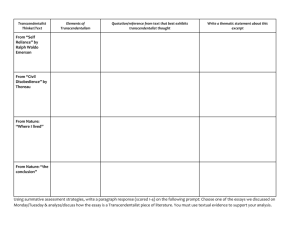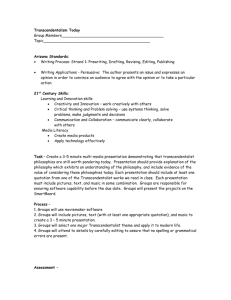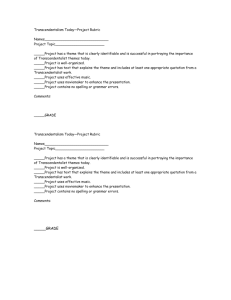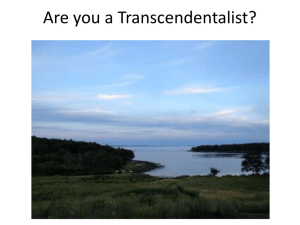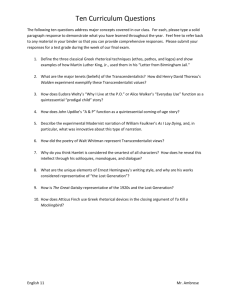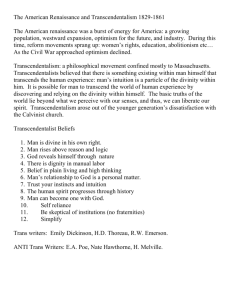American Transcendentalism
advertisement
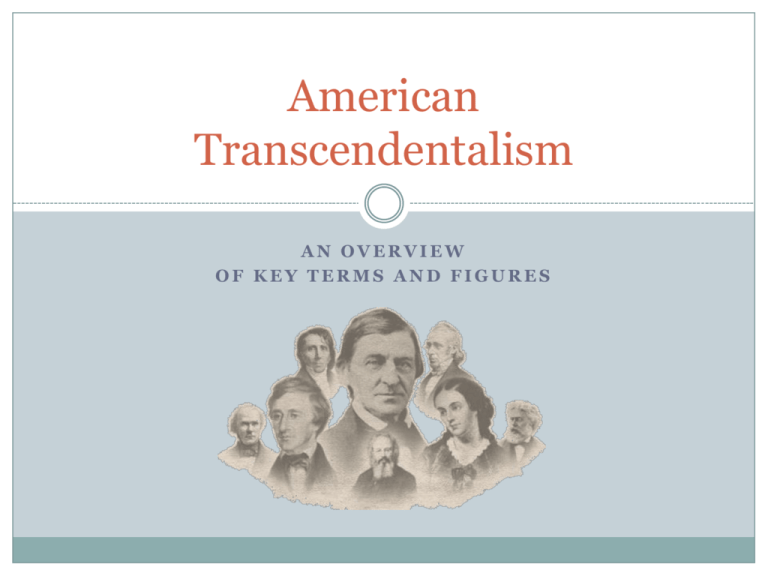
American Transcendentalism AN OVERVIEW OF KEY TERMS AND FIGURES Transcendentalism: Some attempts at a Definition Walter Leighton – “The doctrine that man has a knowledge of philosophic principles by an immediate beholding without the process of reason or aid of experience.” [similar to Wordsworth’s ‘spontaneous overflow of powerful feeling’] Kenneth Walter Cameron – “the American tributary of European Romanticism . . . a new humanism based upon ancient classical or Neo-Platonic supernaturalism and colored by Oriental mysticism.” Merle Curti – “a revolt against the rationalism of the 18th century. It emphasized those aspects of man’s nature that were said to transcend or be independent of experience.” Odell Shepard – “Transcendentalism was in essence a philosophy and a religion of reform.” Charles Mayo Ellis - “This, then, is the doctrine of Transcendentalism, the substantive, independent existence of the soul of man, the reality of conscience, the religious sense, the inner light, of man’s religious affections, his knowledge of right and truth, his sense of duty . . . His love for beauty and holiness, his religious aspirations— with this is starts as something not dependent on education, custom, command, or anything beyond man himself.” James Murdock - “Spontaneous Reason acquaints us with the true and essential nature of things.” Key Theological Terms Congregationalism: a system of church organization maintaining ecclesiastical sovereignty; that is, holding individual congregations as self supporting and independent from any central doctrinal or organizational governance. Church of the Puritans. Trinitarianism: Theological belief that God is triumvirate, associated with Catholicism and its following churches (Anglican, Eastern Orthodox, etc.), and recognizing the traditional doctrine of God as Father, Son, and Holy Spirit. Christ is, therefore, preexistent and divine, of God. Unitarianism: Theological perspective that rejects the trinity, viewing God as a singular entity; more progressive wing calls into question the divinity of Jesus Christ, viewing Christ as a prophet, rather than an element or incarnation of God. Reason, science, and philosophy co-exist with faith in God. Antinomianism: a Christian heresy maintaining that the dictates of the Holy Spirit upon the individual soul must take precedence over the conventions of law and doctrine, ie. faith trumps law. Key Philosophical Terms Romanticism: European intellectual and artistic movement led by German philosophers and embraced by British literary artists. Emphasized beauty of nature, preeminence of individual over the collective, objected to social constraints, and valued emotional and intuitive perception over reason. Materialism: Contends that the practical, physical needs of the material body dictate its primary order and that reality is a value of matter and energy. Idealism: Contends that reality as we know it is primarily a mental construct and that supernatural or ideational awareness can supersede material value or reality. Higher Criticism: Biblical scholars who sought to find the meaning of “the world behind the text” by examining its originary contexts and meanings; as opposed to those “lower critics” for whom the text itself was the focus of study and theological meaning. A more historically and metaphorically informed reading of scriptural texts than the literal text-based scholarship that had preceded it. Key Creations Lyceum Movement: an early social experiment in adult education; community organized presentations and entertainments that supported travelling lecturers and performers while also serving social functions. (modeled after Aristotle’s Lykium in Athens, Greece) Catalogue Rhetoric: the spontaneous listing of elements and aphorisms that is characteristic of Transcendentalist writing. Perhaps reaches its apex in the poetry of Whitman. The Dial: From its inception in 1840 to its closing in 1844, this was the primary journal of Transcendentalist thought. Brook Farm: Early (failed) experiment in socialist living, led by George Ripley. Education Reform: Early experiments in education reform led to establishment of Kindergarten and of other progressive models. Key Figures of the Transcendentalist Movement James Marsh (1794-1842): Congregationalist minister, literary critic and translator. Early proponent of Coleridge and German thinkers, his explanation of the separation of implicit Reason from empirical proof greatly influenced Transcendentalism’s development. Frederic Henry Hedge (1805-1890): Unitarian minister and primary founder, with Emerson and Ripley, of the Transcendentalist Club (originally termed “Hedges’ Club”). Like Marsh, one of the earliest, strongest proponents of the new German philosophy and theology. George Ripley (1802-1880): Unitarian minister, one of the founders of the Transcendentalist Club (first meeting held in his home). Left ministry to become principle founder of Brook Farm, experiment in communal living. Ralph Waldo Emerson (1803-1882): Effectively the leading spokesperson for the Transcendentalist movement, he became the most successful lecturer of his age, a widely published essayist and poet. His work emphasizes the sanctity of the individual. Bronson Alcott (1799-1888): Perhaps the most passionate of the early Transcendentalists, Alcott was a writer, teacher, and education reformer. Founder of both an experimental school and the Fruitlands utopian community, both of which failed in practice but lent lasting ideas for future reformers. Father of Louisa May Alcott, whose novels and stories borrow heavily from her experiences growing up among the Transcendentalists. Orestes Brownson (1803-1876): Founder of the influential Boston Quarterly Review, Brownson was of modest means and trained as a Universalist minister. He converted to Unitarianism and became a leading early proponent of Transcendentalism. Earliest to embrace social causes of poor; later became critical of what he saw as elitism and intellectualism without action within movement. This led to his conversion to Catholicism and embrace of that religion’s doctrine of Charity. Later, published Brownson’s Quarterly Review. Henry David Thoreau (1817-1862): Emerson’s most famous follower and friend, Thoreau ultimately broke beyond Emerson’s implicit conservatism to forge a more radical vision of individual rights and the limitations of the state. Perhaps the most influential Transcendentalist thinker to today. Margaret Fuller (1810-1850): Perhaps the first American woman to make a living as a full-time writer as a journalist and book reviewer, certainly one of our earliest feminist voices. Widely recognized as the “best read person in New England, man or woman,” she was the first woman given access to the Harvard Library and served as the first editor of The Dial. Died in shipwreck; Thoreau sent to recover her body. Theodore Parker (1810-1860): Reformist Unitarian minister, early member of the Transcendentalist Club. Unlike most in movement, of humble origins. Controversial higher critical views included denying Biblical miracles and divinity of Jesus. Called for an intuitive faith led by inner light, not the textual strictures of dogma. Staunch supporter the “Social Gospel” of reformist causes, including abolitionism, temperance, and women’s rights. Elizabeth Peabody (1804-1894): Businesswoman and educator, her West Street Bookstore stocked many influential and difficultto-procure German titles and also provided space for Margaret Fuller’s series of “Conversations” for women. Served as Business Manager for The Dial and, later, founded first Kindergarten in U.S. Thomas Wentworth Higginson (1823-1911): Second generation Transcendentalist, Unitarian minister and staunch abolitionist during 1840s50s. Led the 1st South Carolina Volunteers, the first regiment of freed African-American slaves to serve in the Civil War. Effectively “discovered” and mentored Emily Dickinson and served as her editor after her death. Jones Very (1813-1880): Second generation Transcendentalist. A Shakespearean scholar, he was also influenced by the British Romantics to forge a neo-Classical poetry that sought to spread the Transcendentalist message. Saw himself as a prophet and suffered emotional collapse in later life. Walt Whitman (1819-1892): Poet, essayist, and journalist, deeply influenced by the Transcendentalists in both their humanism and in their invention of catalog rhetoric, which he used to become “the father of American blank verse.” His frank treatment of sexuality led to charges of obscenity for his work. Devoted his life to writing and revising his masterwork, Leaves of Grass. Additional Stuff A “brotherhood of the like-minded” (that included sisters) Why should any religion institution have greater claim to authority than the individual conscience or inner light? The first group of American intelligentsia to advocate that the great nonwestern religious traditions be taken seriously as possible paths to religious understanding.
